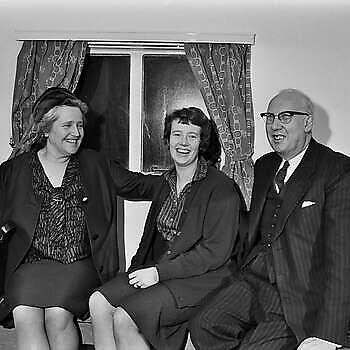In the early 1960s, the political composition of the coalition of confessional and social democrats changed to a collaboration of confessional parties and liberals. The multilateral orientation shifted towards recognition of the possibilities of bilateral policy. The focus on the benefits of trade promotion continued.
In 1963, the first State Secretary for Foreign Affairs 'responsible for aid to less developed areas' was appointed. Despite some opposition from the Ministry of Finance and Economic Affairs, after the appointment of Diepenhorst, development cooperation seemed to definitively fall under the domain of the Ministry of Foreign Affairs.
Little support
Diepenhorst did not have an easy position as State Secretary. He received little support from the Minister of Foreign Affairs, Joseph Luns, and was constantly in conflict with Economic Affairs over the direction and coordination of policy. About Luns, Diepenhorst wrote in his diary:
"Joseph always says: (...) I have no regard for idealistic talk, you must remember that there is only one guideline: the Dutch interest and nothing else (also with development aid: he and Joan Witteveen [Minister of Finance - ed.] have said more than once that they find it utter nonsense and a waste of money, but that it just has to be done because Parliament insists)."
Growth
The budget for development cooperation was also under great pressure. Despite repeated calls from Parliament to allocate more money for development aid, Diepenhorst twice (July 1964 and March 1965) put his position on the line to block proposed budget cuts. Under pressure from Economic Affairs, he also had to allocate four million guilders in the budget of 1965 to stimulate bilateral trade relations with developing countries, and other items were added, such as emergency aid to combat famine in India in 1966. As the number of items grew, so did the complexity of the problems and the bureaucratic apparatus that developed policies for them. This growing complexity and expansion paved the way for stronger institutional embedding and eventually a full ministerial post for development aid.
Mockery and criticism
This first special minister of the Netherlands for development faced a lot of mockery and criticism. However, he received little support from other ministers, hence not all of the criticism was justified (see for a dissenting opinion, Coppens, 2019, p. 80-84).
Sources:
- Nederlandse ontwikkelingssamenwerking 1949-1989
- Biografie Isaac Diepenhorst.
- Paul Hoebink, Hoe de dominee de koopman versloeg: Nederlandse ontwikkelingssamenwerking gewogen (Internationale Spectator 2006)
- Coppens, H.A.J. (2019), "Ministers voor de schone schijn? De eerste vijf ministers voor Ontwikkelingssamenwerking van Nederland", Hoofdstuk 2 Voorgeschiedenis 1945-'65
